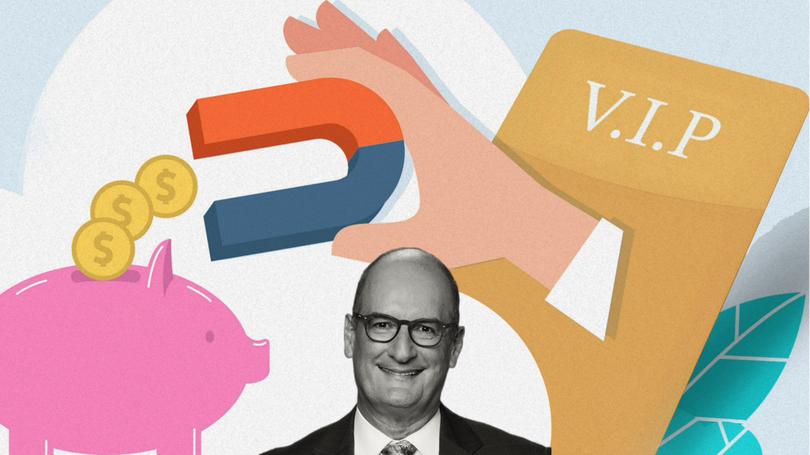DAVID KOCH: The dirty tricks businesses use to keep you locked in and how to avoid them
DAVID KOCH: Complacency kills your hip pocket and people need to be more sceptical about their bills and make sure they’re not paying more than they need to. Here’s why loyalty doesn’t always pay...

In corporate speak it’s called “renewal optimisation process”. To you and I, it’s called “how much can I rip off loyal customers”.
It’s a tactic that has been going on for years in the financial industry. Basically, it judges how rusted on you are as a customer and the maximum amount your financial institution can get away with charging you.
You thought being a loyal customer was always rewarded with the best deals, didn’t you? Sorry to burst that bubble. Loyalty simply doesn’t pay.
Sign up to The Nightly's newsletters.
Get the first look at the digital newspaper, curated daily stories and breaking headlines delivered to your inbox.
By continuing you agree to our Terms and Privacy Policy.Australia’s biggest general insurer IAG was recently hit with a class action alleging its algorithm modelling estimated the likelihood of existing customers renewing and the price at which they would probably accept an offer. It incorporated how long customers had held policies and how many policies they had, the lawsuit says.
Some customers were then hit with a “loyalty uplift” in pricing that was greater than any subsequent so-called “loyalty discount”, the lawsuit says.
The corporate cop, ASIC, is already undertaking an investigation into the algorithm and alleging that IAG’s systems stung people it thought were more likely to tolerate a higher premium on renewal.
It alleged that the results of IAG’s model “was used in the renewal optimisation process for the purpose of allocating a smaller relative price increase to the policies that were predicted to be less likely to renew at higher prices; and a larger relative price increase to the policies that were predicted to be more likely to renew at higher prices”.
You’ll see on a number of insurance policy renewals that a “loyalty discount” has been included. These marketing ploys are essentially worthless to us.
But because we think we’re getting a good deal, we often neglect to look elsewhere and could be missing out on hundreds of dollars in savings.
It’s like Stockholm syndrome for insurance.
Meanwhile, those same companies reserve their best offers to attract new customers.
I’ve even heard of some insurance companies deliberately formatting automatic renewal emails so that they land in your junk folder in the hope you won’t notice and will simply roll over.
It’s a kick in the guts for hard-working Australians who spend a huge chunk of their pay packet paying off their insurance premiums. Insurance costs were up 16.4 per cent in the year to March. That’s quadruple the inflation rate, and so many of us have let them get away with it.

I’ve been saying for years that loyalty doesn’t pay. My best bit of financial advice is to always shop around for the best deals on everything.
Those who have been following me for a while know my wife Libby is the world’s best when it comes to household finances. She has managed ours ever since we were married.
Her golden rule is that she never automatically renews an insurance policy or pays an energy bill without checking to see if there is a better deal elsewhere. Comparison websites are always her go-to.
Over the years they have developed some of the best tools to help people compare their energy bills, health insurance and home loans. But what I find outrageous is the number of big car and home insurance companies that just won’t play ball.
Every year, these insurance companies are invited to list their products on the comparison sites. When it comes to home loans, health insurance and energy retailers most of them do.
But most of the big car and home insurance companies refuse to be compared. I wonder why? I reckon it’s time for customers to put the pressure on.
If a company doesn’t list its policies for comparison you could quite rightly think: “What have they got to hide?”
But it’s not just insurance companies that impose a loyalty tax. The Reserve Bank regularly monitors the home loan interest rate differential between what existing and new home loan borrowers are paying.
Over the years that interest rate differential has been on average over 0.5 per cent. That’s the equivalent of two RBA 0.25 per cent rate cuts. On a mortgage of $750,000 to $1 million, that’s a lot of money.
Around two months ago I was helping a family with their bills and found they were paying 7.5 per cent on a home loan they had for years and never checked. They rang the bank and received an immediate 1.25 per cent cut to their rate.
Complacency kills your hip pocket and people need to be more sceptical about their bills and make sure they’re not paying more than they need to.
I’d urge anyone who’s been with the same bank, insurer or telco for the past few years to be a bit inquisitive, do some research, and see if you’re actually getting a good deal.
And don’t tell me you don’t have the time. Based on an hourly rate I can almost guarantee it will it will be the most profitable time you’ve spent in years.
David Koch is the economic director at Compare the Market.
